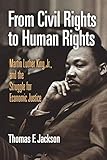From Civil Rights to Human Rights : Martin Luther King, Jr., and the Struggle for Economic Justice / Thomas F. Jackson.
Material type: TextSeries: Politics and Culture in Modern AmericaPublisher: Philadelphia : University of Pennsylvania Press, [2013]Copyright date: ©2007Description: 1 online resource (472 p.) : 13 illusContent type:
TextSeries: Politics and Culture in Modern AmericaPublisher: Philadelphia : University of Pennsylvania Press, [2013]Copyright date: ©2007Description: 1 online resource (472 p.) : 13 illusContent type: - 9780812220896
- 9780812200003
- 323.092
- E185.97.K5 ǂb J34 2007eb
- online - DeGruyter
| Item type | Current library | Call number | URL | Status | Notes | Barcode | |
|---|---|---|---|---|---|---|---|
 eBook
eBook
|
Biblioteca "Angelicum" Pont. Univ. S.Tommaso d'Aquino Nuvola online | online - DeGruyter (Browse shelf(Opens below)) | Online access | Not for loan (Accesso limitato) | Accesso per gli utenti autorizzati / Access for authorized users | (dgr)9780812200003 |
Browsing Biblioteca "Angelicum" Pont. Univ. S.Tommaso d'Aquino shelves, Shelving location: Nuvola online Close shelf browser (Hides shelf browser)

|

|

|

|

|

|

|
||
| online - DeGruyter A People Born to Slavery" : Russia in Early Modern European Ethnography, 1476–1748 / | online - DeGruyter Dreams of a More Perfect Union / | online - DeGruyter The Burned-over District : The Social and Intellectual History of Enthusiastic Religion in Western New York, 1800–1850 / | online - DeGruyter From Civil Rights to Human Rights : Martin Luther King, Jr., and the Struggle for Economic Justice / | online - DeGruyter Ethnographies of Neoliberalism / | online - DeGruyter Women's Human Rights : The International and Comparative Law Casebook / | online - DeGruyter The Purposes of Paradise : U.S. Tourism and Empire in Cuba and Hawai'i / |
Frontmatter -- Contents -- Introduction -- Chapter 1 Pilgrimage to Christian Socialism -- Chapter 2 The Least of These -- Chapter 3 Seed Time in the Winter of Reaction -- Chapter 4 The American Gandhi and Direct Action -- Chapter 5 The Dreams of the Masses -- Chapter 6 Jobs and Freedom -- Chapter 7 Malignant Kinship -- Chapter 8 The Secret Heart of America -- Chapter 9 The War on Poverty and the Democratic Socialist Dream -- Chapter 10 Egyptland -- Chapter 11 The World House -- Chapter 12 Power to Poor People -- Epilogue -- Notes -- Bibliography -- Acknowledgments
restricted access online access with authorization star
http://purl.org/coar/access_right/c_16ec
Martin Luther King, Jr., is widely celebrated as an American civil rights hero. Yet King's nonviolent opposition to racism, militarism, and economic injustice had deeper roots and more radical implications than is commonly appreciated, Thomas F. Jackson argues in this searching reinterpretation of King's public ministry. Between the 1940s and the 1960s, King was influenced by and in turn reshaped the political cultures of the black freedom movement and democratic left. His vision of unfettered human rights drew on the diverse tenets of the African American social gospel, socialism, left-New Deal liberalism, Gandhian philosophy, and Popular Front internationalism.King's early leadership reached beyond southern desegregation and voting rights. As the freedom movement of the 1950s and early 1960s confronted poverty and economic reprisals, King championed trade union rights, equal job opportunities, metropolitan integration, and full employment. When the civil rights and antipoverty policies of the Johnson administration failed to deliver on the movement's goals of economic freedom for all, King demanded that the federal government guarantee jobs, income, and local power for poor people. When the Vietnam war stalled domestic liberalism, King called on the nation to abandon imperialism and become a global force for multiracial democracy and economic justice.Drawing widely on published and unpublished archival sources, Jackson explains the contexts and meanings of King's increasingly open call for "a radical redistribution of political and economic power" in American cities, the nation, and the world. The mid-1960s ghetto uprisings were in fact revolts against unemployment, powerlessness, police violence, and institutionalized racism, King argued. His final dream, a Poor People's March on Washington, aimed to mobilize Americans across racial and class lines to reverse a national cycle of urban conflict, political backlash, and policy retrenchment. King's vision of economic democracy and international human rights remains a powerful inspiration for those committed to ending racism and poverty in our time.
Mode of access: Internet via World Wide Web.
In English.
Description based on online resource; title from PDF title page (publisher's Web site, viewed 26. Apr 2024)


